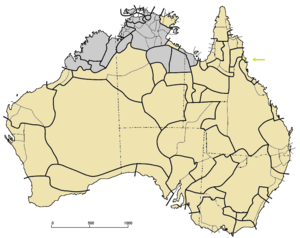Yidiny language facts for kids
Quick facts for kids Yidiny |
||||
|---|---|---|---|---|
| Native to | Australia | |||
| Region | Queensland | |||
| Ethnicity | Yidinji, Gungganyji, Wanjuru, Madjandji | |||
| Native speakers | 52 (2021 census) | |||
| Language family |
Pama–Nyungan
|
|||
| Dialects |
Yidinj
Gunggay
Wanjurr (Wanyurru)
Madjay
|
|||
| AIATSIS | Y117 | |||

Yidiny (green, with arrow) among other Pama–Nyungan languages (tan)
|
||||
|
||||
Yidiny (pronounced Yidiɲ) is an Aboriginal language from north-east Queensland, Australia. Sadly, very few people speak Yidiny today, making it a nearly extinct language. It was traditionally spoken by the Yidinji people.
The areas where Yidiny was spoken include parts of the Cairns Region and Tablelands Region. This includes places like Cairns, Gordonvale, the Mulgrave River, and the southern Atherton Tableland, such as Atherton and Kairi.
Contents
What is Yidiny?
Yidiny is part of a large group of languages called Pama–Nyungan. Think of it like a big language family tree, and Yidiny is its own special branch.
Some people used to group Yidiny with another language called Djabugay. However, experts now believe Djabugay belongs in a different part of the Pama–Nyungan family.
Sounds of Yidiny
Every language has its own unique sounds, and Yidiny is no different!
Vowel Sounds
Yidiny has three main vowel sounds, similar to the 'a' in father, 'i' in machine, and 'u' in flute. What's interesting is that these vowel sounds can be long or short, which changes the meaning of a word.
| Front | Back | |
|---|---|---|
| Close | i | u |
| Open | a | |
Consonant Sounds
Yidiny has many consonant sounds. Unlike English, Yidiny doesn't have separate sounds for 'p' and 'b' or 't' and 'd' that are different just by how much air you push out. Instead, the sounds are more like the 'b' in bat or 'd' in dog.
| Lips | Tongue Tip | Tongue Curled | Middle Tongue | Back Tongue | |
|---|---|---|---|---|---|
| Stop | b | d | ɟ | g | |
| Nasal | m | n | ɲ | ŋ | |
| Glide | w | l | ɻ | j | |
| 'R' Sounds | r |
Yidiny has two different 'r' sounds. One is like a rolled 'r' (like in Spanish), and the other is a softer 'r' sound.
How Yidiny Works (Grammar)
Yidiny grammar is quite interesting! It uses small words called particles that can change the meaning of a whole sentence. These particles don't change their form, unlike other words.
- nguju means 'not' or 'no'.
- giyi means 'don't'.
- biri means 'done again'.
- yurrga means 'still'.
- mugu means 'couldn't help it' (for something you had to do even if you didn't want to).
- jaymbi / jaybar means 'in turn'. For example, if you hit someone and they jaymbi hit you back.
Pronouns and Pointing Words
In Yidiny, words like 'I', 'you', 'he', 'she' (called pronouns) work differently from words that point to things, like 'this' or 'that' (called deictics).
Word Endings (Affixes)
Yidiny is an agglutinative language. This means it adds many small parts, called affixes, to the ends of words to change their meaning. It's like building words with LEGO bricks!
- -nggu shows who did the action.
- -mu or -m' shows where something came from.
- -nyu shows something happened in the past.
- -ng shows something is happening now or will happen in the future.
There are also special affixes that make the last vowel sound of a verb longer.
- -Vli- means 'do while going'. So, magi- (climb up) + -Vli- + past tense becomes magiilinyu, meaning 'went up, climbing'.
- -Vlda- means 'do while coming'. So, magi- (climb up) + -Vlda- + past tense becomes magiildanyu, meaning 'came up, climbing'.
Another affix, -ŋa, can change a verb in two ways:
- It can mean 'do something to someone/something' (like maŋga- 'laugh' becomes maŋga-ŋa- 'laugh at').
- It can mean 'make something happen' (like warrŋgi- 'turn around' becomes warrŋgi-ŋa- 'turn something around').
Sometimes, a word can have both meanings, and you figure it out from the rest of the sentence.
Keeping Syllables Even
Yidiny speakers often prefer words to have an even number of syllables (like 2, 4, 6). Because of this, the affixes (word endings) can change depending on the word they are added to.
For example, the past tense ending is -nyu if the verb already has three syllables, making the new word have four syllables. But if the verb has two syllables, the last vowel gets longer and -Vny is added, making the new word still have two syllables. This helps keep the rhythm of the language!
Some Yidiny Words
Here are a couple of interesting words from the Yidiny language:
- bunggu: This word means 'knee'. But it's also used more widely to describe the part of anything that helps it move forward. For example, it can be the hump on a snake's back as it wiggles, the swish point of a crocodile's tail, or even the wheel of a car!
- jilibura: This is the 'green (tree) ant'. This ant was special because its 'milk' (a liquid it produced) was mixed with ashes from certain trees, like the blue gum or quandong tree. This mixture was then drunk to help with headaches. While there was a general word for ants (munyimunyi), jilibura was always called by its own name because of its unique medicinal use.
See also
 In Spanish: Idioma yidiny para niños
In Spanish: Idioma yidiny para niños
 | Bessie Coleman |
 | Spann Watson |
 | Jill E. Brown |
 | Sherman W. White |

